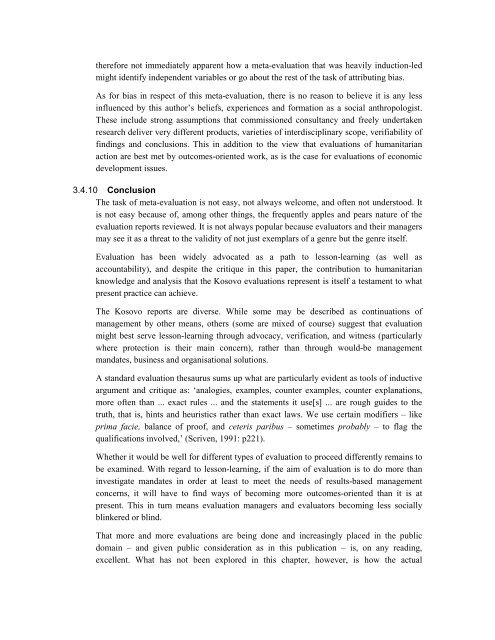Download PDF - ReliefWeb
Download PDF - ReliefWeb
Download PDF - ReliefWeb
You also want an ePaper? Increase the reach of your titles
YUMPU automatically turns print PDFs into web optimized ePapers that Google loves.
therefore not immediately apparent how a meta-evaluation that was heavily induction-led<br />
might identify independent variables or go about the rest of the task of attributing bias.<br />
As for bias in respect of this meta-evaluation, there is no reason to believe it is any less<br />
influenced by this author’s beliefs, experiences and formation as a social anthropologist.<br />
These include strong assumptions that commissioned consultancy and freely undertaken<br />
research deliver very different products, varieties of interdisciplinary scope, verifiability of<br />
findings and conclusions. This in addition to the view that evaluations of humanitarian<br />
action are best met by outcomes-oriented work, as is the case for evaluations of economic<br />
development issues.<br />
3.4.10 Conclusion<br />
The task of meta-evaluation is not easy, not always welcome, and often not understood. It<br />
is not easy because of, among other things, the frequently apples and pears nature of the<br />
evaluation reports reviewed. It is not always popular because evaluators and their managers<br />
may see it as a threat to the validity of not just exemplars of a genre but the genre itself.<br />
Evaluation has been widely advocated as a path to lesson-learning (as well as<br />
accountability), and despite the critique in this paper, the contribution to humanitarian<br />
knowledge and analysis that the Kosovo evaluations represent is itself a testament to what<br />
present practice can achieve.<br />
The Kosovo reports are diverse. While some may be described as continuations of<br />
management by other means, others (some are mixed of course) suggest that evaluation<br />
might best serve lesson-learning through advocacy, verification, and witness (particularly<br />
where protection is their main concern), rather than through would-be management<br />
mandates, business and organisational solutions.<br />
A standard evaluation thesaurus sums up what are particularly evident as tools of inductive<br />
argument and critique as: ‘analogies, examples, counter examples, counter explanations,<br />
more often than ... exact rules ... and the statements it use[s] ... are rough guides to the<br />
truth, that is, hints and heuristics rather than exact laws. We use certain modifiers – like<br />
prima facie, balance of proof, and ceteris paribus – sometimes probably – to flag the<br />
qualifications involved,’ (Scriven, 1991: p221).<br />
Whether it would be well for different types of evaluation to proceed differently remains to<br />
be examined. With regard to lesson-learning, if the aim of evaluation is to do more than<br />
investigate mandates in order at least to meet the needs of results-based management<br />
concerns, it will have to find ways of becoming more outcomes-oriented than it is at<br />
present. This in turn means evaluation managers and evaluators becoming less socially<br />
blinkered or blind.<br />
That more and more evaluations are being done and increasingly placed in the public<br />
domain – and given public consideration as in this publication – is, on any reading,<br />
excellent. What has not been explored in this chapter, however, is how the actual
















![CynefinFramework final [Read-Only]](https://img.yumpu.com/19017304/1/190x135/cynefinframework-final-read-only.jpg?quality=85)